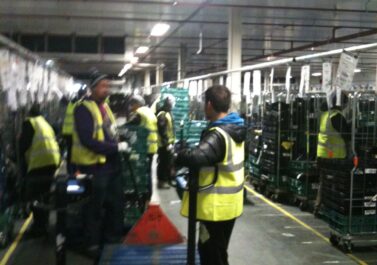We are still in process to understand the massive changes in the retail sector in the UK – the concentration process is rapid (see recent take-over of Bookers by Tesco) and so are the technological changes (online grocery shopping, self-check out etc.). This research will take some more time and efforts. Some of us work in factories of major supermarket suppliers (ready-meal processing), in supermarket distribution centres or as delivery drivers. We have written about our experiences there and will continue doing so. Here we want to use the opportunity to circulate two reports written by friends who work on the actual supermarket shop-floor, handling all the stuff that some of us might have processed, picked or fork-lift driven before. We will edit the reports for circulation in WorkersWildWest no.6 and feed them back to workers swimming in the supply-chain upstream. If you work in the sector and have stories to share, get in touch…
angryworkersworld@gmail.com
*** Angry Waitrose worker
I work for a big Waitrose store in central London, employing around 180 people. In light of the recent changes to the minimum wage (from £6.70 to £7.20 in April 2016), Waitrose has shifted up its minimum (for central London area) to £8.15 per hour. This has caused a certain amount of confusion and irritation, some of the older partners (Waitrose-speak for ‘worker’) consider that their wages have not risen correspondingly, although Waitrose says that they have. Wages are further divided through Waitrose’s five performance categories: under-performing, developing, good, very good and outstanding, subject to an individual annual performance review. The vast majority of partners fall into the ‘developing’ or ‘good’ categories, with a certain amount of anger coming from some of the very committed partners who struggle to get their managers to put them into the ‘very good’ category. The highest category, ‘outstanding’, exists in mythology only, it’s fair to say you would need to live, breathe and shit Waitrose to come close to attaining it. Further, one can become a ‘specialist’ in a certain section (wine, fish, whatever) after a training course and receive an additional wage increase (if there is room for another specialist in the store). All in all it’s possible to get about £9.50 per hour (specialist in ‘very good’ category), without going into a formal management position.
As has happened in other retail companies, Waitrose has got rid of the Sunday, bank holiday and overtime (all weekly hours worked after 39 hours) 1.5x bonus pay for all staff who’s contracts began after February 2016. Some long-standing staff are still on the hallowed double pay bonus, while most are on the 1.5, and more and more new staff in the store are working without any bonuses at all. There’s a certain amount of resentment at this amongst new staff, but as some say, a contract is a contract, a holy and binding agreement, good luck changing that. Certainly this change wasn’t discussed by Partnervoice, our in-house representative body. Perhaps it was assumed that since it would only affect new partners, it wasn’t of interest to existing partners whose contracts would remain the same.
Part of what makes Waitrose a ‘unique’ business model is our democratic in-house representative structure. ‘Partnervoice’ is an elected body of representatives voted for by the various sections in a store to convene each month and discuss the issues of the store and the business generally. In our store it has a pretty limited interest for workers, some of whom consider it to just be a rubber-stamping exercise to legitimise the proposals of management. I was curious to see what it actually did so I joined up. A short training course informed us that we were to take the issues and concerns of the workers from our section and feed them back to the Partnervoice monthly meeting, in which sits the branch manager to listen solemnly and offer solutions. Interestingly, after raising an issue about pay, I was told that we shouldn’t discuss pay, that it was an individual matter relating to the specific worker and their manager. I was also told that the new partner contracts (without bonuses) was not an issue for Partnervoice since it relates to the general direction of the company. So in considering what Partnervoice is actually for I am given various tasks to complete, information to raise with the partners on my section to find out what they want to do for ‘Partnership Day’, why so many partners didn’t show up to the Annual General Meeting, how we can crack down on the number of sick-days taken and so on. I am still wondering whether Partnervoice can be used in some way, or whether it’s inherently a tool of management. Certainly it holds little appeal for the vast majority of workers in my store, although I am told that this is not the case in all stores. I have had a small amount of interest in starting some kind of alternative meeting for all workers which I am keen to consider, although it’s difficult to set a day and a place for such a meeting considering the varied hours and days that we work.
The workers in my store are comprised of a large amount of Philipino and Bangladeshi first or second generation immigrants, the rest being largely young white and black workers. There’s no real division between these groups, and several languages are spoken. The store is organised into several sections, and while workers in each section spend the most time with each other, there are no special cliques or anything like that. There is a certain amount of resentment toward managers and their perceived laziness/uselessness/two-facedness. Generally the work is seen as fairly pointless, rolling cages around, pulling-forward products, cutting up steaks etc., work that could just as well be done by machines. There is a difference here in attitude toward work, with some of the longer-serving workers feeling a sense of pride in their work, a pride which Waitrose tries to foster, a sense of shared ownership, at a minimum-level this is manifest in the idea that ‘the harder you work, the higher your bonus will be at the end of the year.’ Most younger workers think this is bullshit, or vacillate between these two positions. In any case, in order to actually survive at work, it seems necessary to mobilise some kind of fantasy, whether thinking ‘today’s the day I process more cages than I ever have before!’ or ‘today’s the day my cheese counter will look the best it ever has!’
Lots of the young workers live with their parents, and of those that rent, many claim housing benefits. A few workers won’t work more than a certain amount of hours in a week because their payslips are reviewed by the state and they have to be making under a certain amount in order to qualify for low-income housing benefits. One of my colleagues’ entire full-time Waitrose income goes on rent, while he makes another income as the owner of a small catering business. Lots of workers are pissed off at the price of rent and the virtual impossibility of being able to own their own homes in London. Some colleagues work at Waitrose only part-time as extra money on top of weekday jobs, some are doing A-levels or on gap-years or studying at university. Some full-time workers are basically chained to the job, given that they wouldn’t be able to make the same salary (which is relatively decent for the workers with older contracts) leaving fresh for a new job. The cost of living, housing, is a big issue which any potential worker’s organisation is going to need to address seriously.
Practically speaking, unions are non-existent in our store. Nobody is a union member or really knows anything about the trade unions. Whether it would be a good idea to invite a union rep to speak or become one myself I am not sure.
Additionally, our breaks are soon to be subject to change. Currently we get paid breaks according to the number of hours of a given shift. This will be changing so that our hourly rate goes up to cover the loss in break, and our break is no longer paid. None of us have really deciphered what this means exactly yet, but I feel like it’s an underhand way of getting rid of paid breaks to conform with most other retailers, and getting ready for further planned increases in the minimum wage.
*** Angry Sainsbury worker
So I work night shift at a suburban Sainsbury store, putting stock onto shelves, nothing too fancy. The age of our workers ranges from 17 to 70+. Made up of both genders, majority of staff in our store is female. Something like a 65/35 split in that regard. Students are employed here, they generally work later shifts as well on weekends, we are losing a lot of them at the minute though as they are heading back into university/starting university terms. People stay for varying amounts of time, a few have been here for over 20 years since the store first opened. Honestly it really does vary as some can stay for as little as a few days before deciding that they just don’t want to be here whilst others stay on for months or for several years.
The contracts are on a fixed hours basis. Working hours vary from person to person, the minimum contractual hours offered are 12 with the maximum being 39. Full time vacancies are quite rare now though.Everyone is offered a permanent contract, they start with a probationary period of 12 weeks during which there are three assessments and on the successful completion of these you are made permanent. The only time we have temps are at Christmas when the workload increases. Students can have a dual location contract where they can work at a Sainsbury’s near their university during term time and then during holidays they can work at stores closer to their homes. They offer what is known as an RGS contract (no idea what it stands for) however some of the more veteran workers are on an older version of the RGS which gives them double pay for overtime as well as late night and Saturday premiums etc. Newer contracts don’t have these kinds of perks.
There are skill payments as the bakers receive extra pay, the amount of time you have worked there doesn’t affect the pay you are given. All are paid the same no matter their experience.
Bonuses are based on our MCM measures ( mystery customer measures = MCM ), we are assessed 26 times over the course of a year and depending on the percentage scored per visit we are awarded a medal ( bronze, silver, or gold ). Depending on the medals received by the end of the year we will either get a 1 percent, 2 percent or a 3 percent bonus to our June/July wage. It is a taxable bonus.
Wages did rise following the increase to the minimum wage but structurally speaking nothing has changed. There are several benefits, the staff discount at our own stores is the most obvious. This can vary from 10 to 20 percent with the 20 percent usually tied to targets set by the head office.
The work process looks roughly like this:
1) Pallets, Roll cages and blue crates containing the products arrive at the rear of the store via truck.
2) During the day back door staff unload the lorry, at night the Night shift manager does the unloading. Delivery is accepted on a handset at this point.
3) Grocery deliveries get broken down from mixed pallets and rollers to isle based rollers ( tea and coffee on its own roller, cans and soup on its own roller etc )
4) Night time deliveries tend to just be fresh products ( meat, cheese, milk etc ) or advanced grocery deliveries for the next day, the fresh delivery is isle ready to work and doesn’t need breaking down. The advanced deliveries are left in the warehouse to be sorted out the next day.
5) Rollers and pallets are left in the warehouse until just before nightshift workers arrive at work, then they are dragged onto the shop floor and left next to the relevant isles. Fresh deliveries remain in the chillers until workers are available to start working them.
6) Workers unwrap the products from their packaging and place the products onto the shelves, there is no electronic component involved. If there is a gap on the shelf then the product goes into the empty space, its usually left to a workers own knowledge of the isle to locate the correct location for the product.
7) If the product can not go out onto the shelf it is put onto a roller or U-shape for overs and is left in the warehouse to be worked at a later date.
8) At some point in the day customers take the products from the shelves.
9) Day-Shift workers can replenish the shelves from back stock that accumulates over time in the warehouse.
10) When items are checked out they are logged by the system which generates the next order to ensure that if a potential gap appears more stock will be there within a few days.
Then there is the work for online-shoppers. The online shoppers are what we call the workers who go about the store picking up the products that people have ordered online, so they gather it all together before taking it to the drivers so that it can then be delivered. In terms of vans you are looking at about 6-8 of them, and we have at least 100+ online orders a day but no more than 200 a day.
Things can go wrong, it can be a mix of both human error and technical faults. The only instance of recent human error that comes to mind is that on Sunday night all of the empty rollers from the day were accidentally removed by an outgoing delivery truck leaving us to effectively ration the few in the building left to us from what came in on later deliveries. The last example of technical issues was when the handsets for online shopping went haywire as a result of the system going down, resulting in orders with wildly unrealistic orders e.g 20+ cartons of milk for one person. Its not too common that anything major goes wrong, but as with any other job you get little issues every other week. Generally speaking there isn’t too much that workers can do but adapt to the realities of the situation and management is left with sorting out the issues.
We don’t get given an exact number of products that need to be worked, but we are given a time limit based on how much stock there is, so I might be given 6 hours down the soft drinks isles and then 4 hours down cheese and fats. There isn’t really an overall target, we simply get told how many hours we have to work the delivery and then we go and try to complete what has arrived in store. Its isn’t always possible to do it, too much stock for one person to work can come in but whatever we don’t do gets left for the day shift to work on at some point in the day. If we are faster than expected and complete the isles set to us we will either go to other isles in store and help to complete the work that needs to be done there, or we will work the back stocks out in the warehouse. We cant go for additional breaks (we are limited to 45 minutes of break time per shift) and in the year I’ve been here we have only been offered the chance to go home early once but our pay would be cut if we were to do so, so no-one took management up on that offer. If we are slower there is meant to be a system in place where if we fell behind schedule on 3 separate occasions we get a disciplinary, however that system has only ever been implemented for about 2 weeks or so out of the entire year. We don’t have to stay longer if we fall behind, we just drag what we haven’t worked back out into the warehouse/chiller to be worked by staff in the day.
The work intensity definitely varies from job to job in store, each job can be intense at different times depending on the time of day or season of the year. The busiest times of the day are around the 12:00 mark as well as the 15:00-17:00 time period due to schools and workplaces closing for the day. You tend to see an uptake in the number of customers around major celebrations in the year like Christmas/Easter etc. Workers from day shift will get drafted into working on the checkouts if the number of customers leads to queues forming, this tends to have an impact on the rest of the store though as it means back stock wont get worked which will then impact nightshift as we have to work whatever gets left over in order to prevent the chillers and warehouse becoming overwhelmed by the sheer amount of goods waiting to be sold. The amount of work remains fairly consistent throughout the year, with the only increase in workload taking place around major seasonal celebrations, the only other change that has recently taken place has been a focus on getting the entire fresh goods delivery finished for 04:00 in order to ensure that as much of the produce is available for the online shoppers as possible. This tends to make it difficult to finish the grocery delivery as you are left with an unsatisfactory amount of time to complete your task ( this happened to me this morning where I was given 3 hours to do about 5 hours worth of work ).
No one really mentions work speed, for the most part we go at our own speed and so long as we get the job done we aren’t pressured by management to alter it. In terms of easing our workload there isn’t anything specific, save for the tools available to us like pump-trucks (mini forklifts of sorts) and our L-shapes that help to move stock around the isle. Otherwise its simply a case of hard work and elbow grease. I wouldn’t say that there are any particular tricks that workers share with one another, more often than not you tend to work in the way that you were taught to by a more veteran fw although if asked for help you do make sure that everyone is doing alright. Individualistic attitudes don’t last too long on nightshift, you can keep to yourself but you cant forget that you are all still working as a team, so at no point do we make it so that our personal workload is easier only to make another workers shift harder.
Workers in the same department can easily talk to each other, and workers on the shop floor can talk to one another, but checkout operators cant communicate with other workers, only with customers. Generally speaking its up to the worker as to whether they go to break as part of a group or not, from my time on nightshift I can say that a large part of nightshift does go to break at the same times. Groups themselves are based on friendships, so we all sit together. It is rare for people from different departments to be on break at the same time so there is never a situation where one part of the store staff separate themselves from another group of staff.
One or two things have come up since I last got in contact and the biggest event will have to be the closure of the local Morrisons, one minute it was there and the next is was shut so I was really taken by surprise by that. The other bit of news is that our wages are going up a tiny bit, so at the minute it is £8.91 and hour for those of us on night shift and I believe that we will be earning around £9.04 an hour or so starting at some point in September 2016. There is only one piece of news that affects multiple stores and that was some kind of initiative being implemented in order to “cut costs”. According to the extremely brief report management gave us a few months back, it would seem that night shift workers in particular were either being made redundant or having their hours changed to daytime shifts. Petrol stations are also being closed at night with the staff offered other roles in store or being made redundant.



